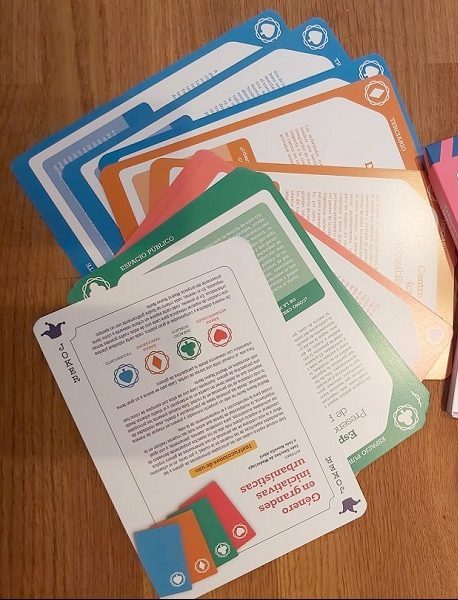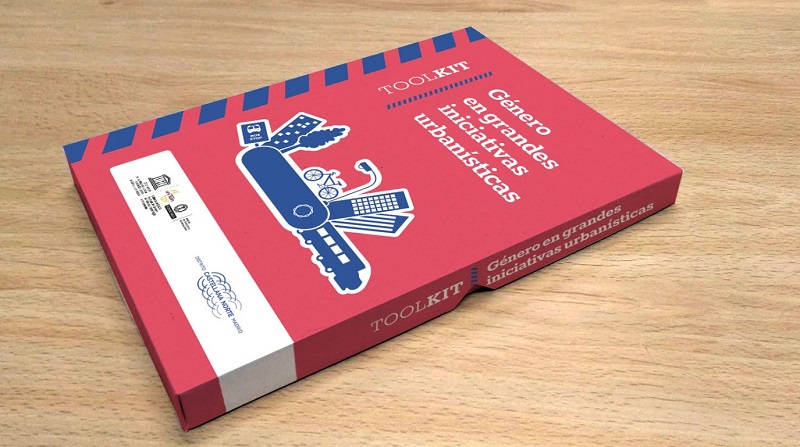15 April 2021
for Madrid Nuevo Norte

The UNESCO Chair for Gender and Equality Policy in Science, Technology and Innovation of the Polytechnic University of Madrid and Distrito Castellana Norte (DCN) today presented the Toolkit: Gender in large-scale urban initiatives a practical manual to address the gender perspective in large-scale urban developments, based on the experience of the work carried out during the planning phase of Madrid Nuevo Norte. This project, one of the first of its kind in Spain to apply these criteria, has been used as a model and case study for this informative work. The aim of the publication is to show, in a simple and attractive way, the main guidelines to be applied to build inclusive cities, which are more responsive to the needs of all people
The Toolkit:Gender in large-scale urban planning initiatives is a manual aimed at communicating, in a graphic and attractive way, the main criteria that urban planning professionals and administrations need to apply in order to build cities that better address to the care-giving needs of people. The manual shows the importance of including the gender perspective in urban planning projects, its benefits for the quality of life of women -and for all citizens in general- and is based on the Madrid Nuevo Norte’s ground-breaking experience with this approach in the application of these criteria within the context of Spain. But the Toolkit is not only for professionals: it is also aimed at members of the general public who want to learn about the criteria to create more inclusive cities for all people. For this reason, it is presented in a simple and attractive format, as a card game and supported by illustrations, to facilitate the understanding of the technical concepts and make them more accessible to citizens.
In this “deck of cards”, each of the four suits is associated with the most important themes for working with the gender perspective in urban design: Residential Areas; Public Spaces; Commercial Areas and Transportation. Each card analyses a specific aspect, such as safety, active mobility, street lighting, green space characteristics, mix of uses, accessible housing, facilities and many others. On the front, each card focuses on a specific question and how to answer it, giving as an example the measures taken in Madrid Nuevo Norte, with the back of each card providing an illustration of the work carried out in this project.

The toolkit lays out the keys to urban planning with a gender perspective in an informative way.
The presentation of this practical guide, which was opened by Manuel Blanco, director of the School of Architecture of the UPM, was attended by Miguel Hernández, director of Strategy and Corporate Development of DCN, who stressed that it is increasingly important when designing cities to ensure that public spaces “take the needs of all the people who live in the city into account equally” and that “we think about the different uses made of the city depending on issues such as gender, age or degree of dependence”. This approach to thinking about urban planning is strongly related to cross-cutting issues that affect the entire population, such as the safety of public spaces and means of transport, care-giving and the use of the city by children, young people, the elderly and dependent people.
Hernández stressed the importance of the inclusion of this perspective from the very start of an urban planning project, that is, starting with its design, as is the case in Madrid Nuevo Norte. “Today, with this Toolkit, we are taking another step forward, drawing the lessons learned from this ground-breaking experience, systematizing it and capturing it in an easy-to-read document, so that it can be shared with urban planning professionals, public administrations and citizens in general. This allows this knowledge to be scaled up and applied in other urban projects, for the benefit of all people,” he concluded.
The conference included a presentation by David Lucas, Secretary General of the Urban Agenda and Housing of the Ministry of Transport, Mobility and Urban Agenda (MITMA), who emphasised the importance of including the gender perspective in urban planning “to ensure that all people enjoy the same possibilities of experiencing their city to the fullest”. Lucas stated that this manual is a very useful tool when it comes to including the gender perspective in important projects, “such as Madrid Nuevo Norte is for Madrid and for Spain”.
The “Toolkit”, which was prepared by Inés Sánchez de Madariaga and Inés Novella, director and researcher, respectively, of the UNESCO Chair of Gender and Equality Policy in Science, Technology and Innovation of the UPM, explains the main specific needs of women in the city, which must therefore be taken into account when designing cities. The manual presents the main aspects to be taken into consideration in urban planning and design, illustrating each of them with examples of how they were addressed in Madrid Nuevo Norte.
Both internationally and in Spain, there is a growing awareness that the gender focus in urban planning cannot be reduced to merely complying with administrative procedures. For this reason, as the Deputy Director General of Urban Policies of MITMA, Ángela de la Cruz noted in her speech, it is important to share the knowledge gained in experiences such as Madrid Nuevo Norte, “a large-scale urban planning action that has taken gender differences into account when designing the city from the early stages of planning, which is what we have to aim for in urban planning”.
During the presentation, the case study of Madrid Nuevo Norte was approached from both the technical perspective, with the presentation by Sara Muñoz, DCN’s Urban Planning and Management Coordinator, and from the social point of view, as explained by Gema del Pozo, DCN’s Director of Social Engagement, to provide a comprehensive vision of this project, which could serve as a model for other urban planning actions.
Gema del Pozo explained that the inclusion of the gender perspective in Madrid Nuevo Norte was in response to the desire to “design cities that don’t limit the right of their citizens to participate fully, freely and equally in their communities, regardless of their gender”. In the project, the gender perspective was incorporated across all of the aspects of the planning from the early stages and throughout the development of the project.
For more than four years, the DCN’s Social Engagement area has been working to promote the participation of women in the neighbourhoods surrounding Madrid Nuevo Norte, looking for ways to mitigate the problems related to care-giving tasks, which are mostly covered by women. Along these lines, the activities were organised at times that were compatible with these tasks, and activities such as play activities or children’s sessions were organised in parallel. As a result, many women were able to take part in the processes of analysis and diagnosis of the existing reality of their neighbourhoods, making it possible to draw representative conclusions. In addition, exploratory walks with a gender focus, workshops and meetings, specifically involving women in the design of urban space, were held in the different neighbourhoods.